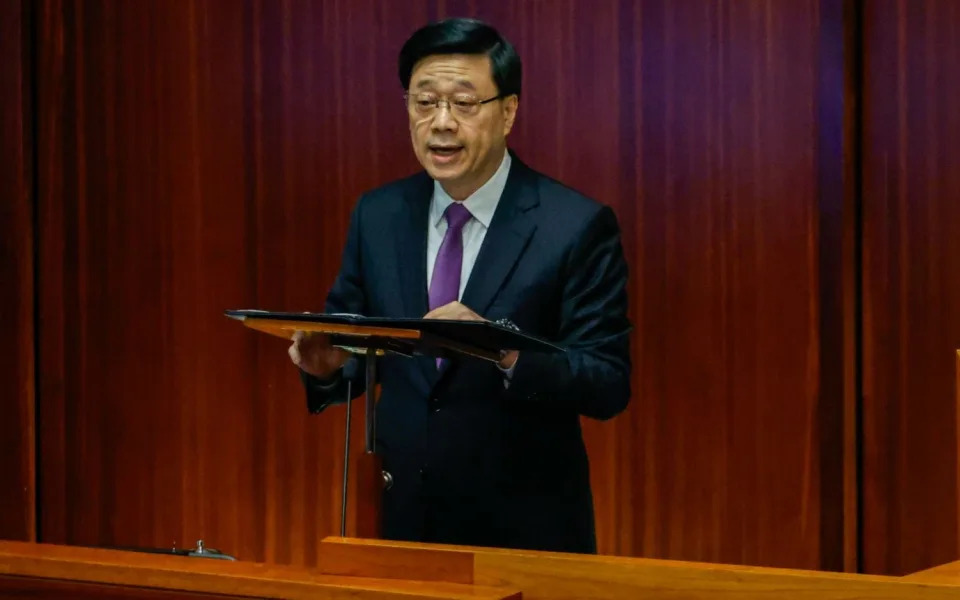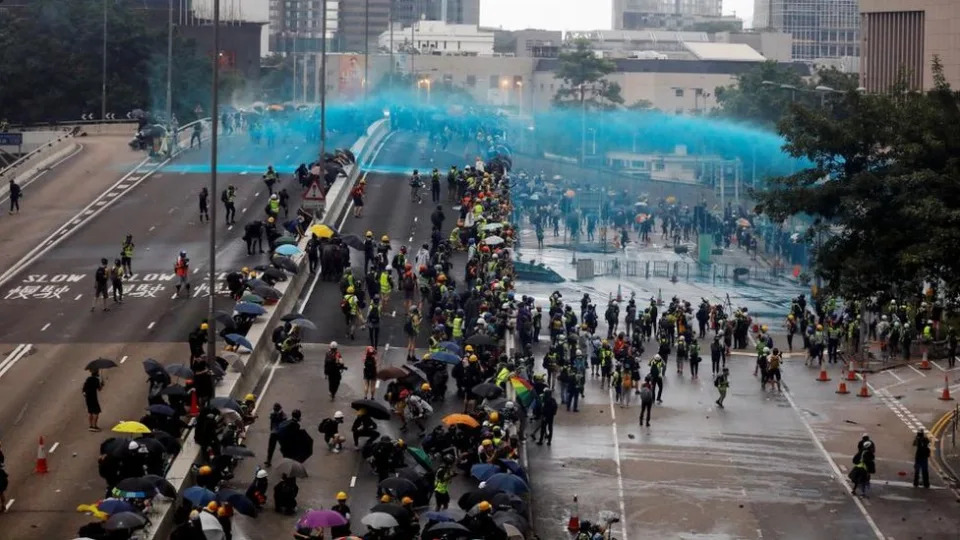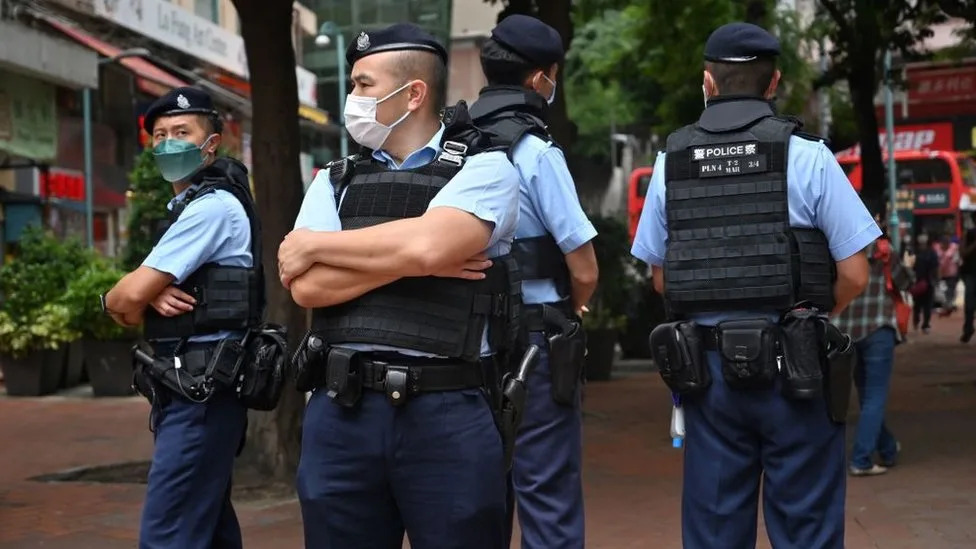Hong Kong’s new national security laws pose threat to Western businesses

Western businesses in Hong Kong face growing uncertainty after politicians passed draconian new national security laws that will align the city-state even more closely with Beijing.
Hong Kong’s Legislative Assembly passed a major piece of legislation known as Article 23 on Tuesday, marking the latest stage of a widespread political crackdown triggered by pro-democracy protests in 2019.
The laws, which will come into force on Saturday, introduce a series of new crimes including treason, sabotage, sedition, the theft of state secrets, external interference and espionage. The punishment for offences ranges from several years to life imprisonment.
Chris Patten, the last British governor of Hong Kong, branded the crackdown “another large nail in the coffin of human rights and the rule of law in Hong Kong”.
The measures, which further tighten the national security laws imposed on Hong Kong by Beijing in 2020, have fuelled concerns about the former British colony’s future as Asia’s business hub.

Analysts pointed to the broad and vague wording of the new laws, which expand the definition of state secrets to cover information ranging from “diplomatic and foreign affairs activities” to the “economic or social development” of both Hong Kong and China.
This will spark fears that financial professionals gathering corporate information for work such as audits and analysis could be accused of espionage and be detained or even imprisoned.
Ho-fung Hung, professor of sociology at Johns Hopkins University, said: “With these draconian and not clearly defined clauses, even apolitical business persons can get into trouble and will face the risk of their office being raided and themselves being detained, arrested or placed under exit ban as in many cases in mainland China. This will surely increase the doubt, anxiety, and uncertainty of foreign businesses in Hong Kong.”
It comes amid a Beijing crackdown on purported spies that has already affected advisory and due diligence firms carrying out work in China.
Several large US consulting firms in the country were raided last year, while in January Beijing accused MI6 of recruiting and training a spy in a consulting agency to gather intelligence in China.
Many multinational companies have already moved their Asian headquarters away from Hong Kong to locations such as Singapore due to concerns about tightening Chinese control.


Under the new laws, citizens could also be imprisoned for keeping old copies of Apple Daily, the pro-democracy newspaper shut down in 2021. Its founder Jimmy Lai is currently on trial on a range of charges under the national security laws.
Maya Wang, acting China director at Human Rights Watch, said: “The new security law will usher Hong Kong into a new era of authoritarianism.
“Now even possessing a book critical of the Chinese government can violate national security and mean years in prison in Hong Kong.”
The imposition of Article 23, which was rushed through Hong Kong’s pro-Beijing Legislative Council in less than a fortnight, is highly symbolic for citizens of the city.
It fulfils a constitutional obligation for Hong Kong to enact its own security legislation after British rule ended. But previous attempts to do so in 2003 were shelved amid widespread public protests.
Authorities say the new laws close loopholes in the national security regime, even though existing laws have already been used to jail pro-democracy protesters who challenged China’s rule over the semi-autonomous territory.
John Lee, the chief executive of Hong Kong, branded the changes a “historic moment”.
David Cameron, the UK Foreign Secretary, said: “The overall impact of Hong Kong’s new national security law is that it will further damage the rights and freedoms enjoyed in the city.”
“It undermines Hong Kong’s implementation of binding international obligations, including the Sino-British Joint Declaration and the International Covenant on Civil and Political Rights.”
Sir Iain Duncan Smith, a former Conservative Party leader, said: “This change to the existing law in Hong Kong is even worse and more oppressive. This will put Hong Kong’s status as an English Common Law jurisdiction in very serious question.”
Article 23: What is Hong Kong's tough new security law?
Hong Kong's leader said the new law is necessary to guard against "potential sabotage and undercurrents that try to create troubles"
Hong Kong has passed a new security law that the government says is necessary for stability, but raises fears that civil liberties will be further eroded.
The law, called Article 23, covers treason, sedition and state secrets, and allows for trials to be held behind closed doors.
When will Hong Kong's Article 23 be introduced?
The bill was passed with little opposition on 19 March, following a month-long consultation.
The city's leader John Lee says he will sign Article 23 into law on 23 March.
China's Vice Premier Ding Xuexiang has said it would protect "core national interests" and allow Hong Kong to focus on economic development.
How long has Hong Kong's Article 23 been planned?
For decades: an attempt to pass the bill back in 2003 was shelved after massive protests.
Half a million Hongkongers came out onto the streets and more than 90,000 submissions were made during a three-month consultation.
Then-chief executive Tung Chee-hwa's administration withdraw the legislation and the strong opposition also saw the resignation of security minister Regina Ip.
The government claims the decision to introduce Article 23 in 2024 follows a 99% support rate during the latest public consultation.
It also follows a national security law (NSL) imposed by Beijing in 2020. Authorities credit it with restoring stability in the city after widespread pro-democracy protests in 2019.
At least 260 people have already been arrested under the NSL, which critics say reduced the city's autonomy.
Mr Lee has said Article 23 is also necessary, to guard against "potential sabotage and undercurrents that try to create troubles".
How does Article 23 change Hong Kong security laws?
The 2024 version of Article 23 allows for closed-door trials and gives the police rights to detain suspects for up to 16 days without charge.
The city's leader will also be given authority to ban organisations and companies from operating in Hong Kong, should they be found "working for foreign forces".
The draft bill expands on the Beijing-imposed national security law, which already criminalises secession, subversion, terrorism and collusion with foreign forces. Other offences it covers include:
-
Theft of state secrets and espionage: The bill has a broad definition of "state secrets". It includes "major policy decisions", "economic or social development" and Hong Kong's "external affairs", among other things. The wording in this section of the bill is almost identical to China's state secrets law, which Beijing is looking to broaden.
-
Sabotage endangering national security: This is a new offence that targets people who endanger national security either intentionally or by "being reckless". It also wants to criminalise computer-related acts that harm national security. Doxxing - the malicious act of publishing people's personal information online - of police officers was cited in the consultation paper as a possible example of such an offence.
-
External interference: This new offence will deal with acts of collaborating with "external forces" to influence or interfere with national and local authorities. Examples include receiving financial support or direction from these "external forces", which could include foreign governments, political organisations or individuals.
-
Insurrection: This will deal with acts such as assisting an armed force - or the organisation to which the force belongs - in an armed conflict against China. Authorities have repeatedly cited unrest due to the months-long pro-democracy protests in 2019 as grounds for legislating this new offence.
-
Treason: In addition to treason, which includes offences such as levying war against China, the new bill seeks to criminalise unauthorised military drilling and "misprision of treason", committed by someone who has knowledge of treason but does not report it.
Those found guilty of treason, insurrection, inciting a member of the Chinese army to mutiny, or colluding with an external force to damage or weaken public infrastructure could be sentenced to life imprisonment.

What are the criticisms of Article 23?
Hong Kong officials have justified Article 23 by saying that most offences outlined in the legislation are also covered under similar laws in Western nations.
However, critics say the new law will give authorities yet another tool to crack down on dissidents and erode freedoms promised to the former British colony when it returned to Chinese rule in 1997.
Article 23 will "take repression to the next level", said Amnesty International's China Director Sarah Brooks. "The rapid progression of legislation under Article 23 shows the government's eagerness to further dismantle human rights protection and turn its back on its international obligations," she said.
The political motivation behind this new bill appears to be "more important than any practical need", said Eric Lai, research fellow at the Georgetown Center for Asian Law.
"The current Beijing-imposed national security law has already silenced dissent and the voices of civil society. Hong Kong has also not seen any large-scale demonstrations in the past three-and-a-half years," he told BBC Chinese.
Mr Lai also questioned if due process could be upheld when lawmakers are asked to scrutinise a bill so quickly.
"How authorities have tried to speed up the consultation and legislation has created an impression that the consultation exercise was conducted purely for the sake of formality," he said.
Former lawmaker Emily Lau believes the new law is "all part of Beijing's policy towards Hong Kong".
"The [Chinese] central government really does not need to be so heavy-handed in dealing with Hong Kong. We are a small city, who are we to jeopardise national security," she said.
Liu, who once chaired Hong Kong's Democratic Party, added that the previous attempt to legislate Article 23 drew passionate discussion and debate which was "allowed by the government".
"This time, I can't quite see it, it's a totally different atmosphere. Hong Kong then and now are like two worlds," she said.
- Questions and Answers
- Opinion
- Story/Motivational/Inspiring
- Technology
- Art
- Causes
- Crafts
- Dance
- Drinks
- Film/Movie
- Fitness
- Food
- Games
- Gardening
- Health
- Home
- Literature
- Music
- Networking
- Other
- Party
- Religion
- Shopping
- Sports
- Theater
- Wellness
- News
- Culture
- War machines and policy


